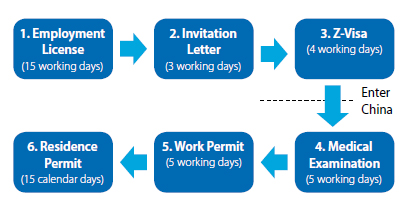Obtaining Work Visas and Residence Permits in China
 Sept. 24 – China recently introduced a new set of rules governing the entry and exit of foreigners, titled the “Administrative Regulations of the People’s Republic of China on the Entry and Exit of Foreigners (hereinafter referred to as the ‘Regulations’).” The Regulations, which came into effect from September 1, 2013, have updated the country’s visa system and introduced several changes to the application of the residence permit, which we discuss below.
Sept. 24 – China recently introduced a new set of rules governing the entry and exit of foreigners, titled the “Administrative Regulations of the People’s Republic of China on the Entry and Exit of Foreigners (hereinafter referred to as the ‘Regulations’).” The Regulations, which came into effect from September 1, 2013, have updated the country’s visa system and introduced several changes to the application of the residence permit, which we discuss below.
Changes to Business and Work Visas
Under the old rules, the two primary visas for business and work in China were the F visa and the Z visa. However, with the new Regulations in place, visa categories and requirements for foreigners who would like to work and do business in the country have been changed significantly.
Business Visa
The F visa, previously known as the business visa, was used by foreign business people who came to China on business but were not employed at a Chinese entity. However, the new Regulations have limited the scope of the visa to non-commercial purposes only, such as cultural exchanges, visits and inspections; and at the same time, introduced a new business visa – the M visa – which is applicable to foreigners coming to the country for business and trade purposes.
To apply for an M visa, foreign business visitors need to submit an invitation letter issued by their commercial partners within China. The Regulations have not listed out the specific application materials for the M visa, but the primary documents required are believed to be comparable to those of the F visa.
Work Visa
Under the current visa system, the Z visa is no longer the only type of visa with which foreign individuals can be employed. Foreigners may also be employed through a new type of visa – the R visa. Such visas are aimed at attracting global talents and apply to senior-level foreign professionals whose skills are urgently needed in China. Applicants for the R visa need to satisfy the requirements stipulated by the relevant competent authorities and must provide relevant documentation.
Changes to Residence Permits
In China, the residence permit allows foreigners an unlimited number of trips into and out of China during the term. The regulation has reduced the minimum validity period for work-related residence permits from the previous 1 year to 90 days, with the maximum period remaining unchanged at 5 years. Therefore, instead of relying on a business visa, any foreigner intending to do business in China for a cumulative 90 days or more may need to apply for a work permit together with a work-related residence permit.
Foreign individuals applying for work-related residence permits need to submit the following documents to the local exit and entry administration authority above the county level:
- Passport or other travel documents, along with photos and additional supporting personal documents
- Fingerprints and other human biometric information
- A health certificate with a validity of more than one year
- Work permit and other relevant supporting materials or relevant supporting documents from authorities that prove the applicant is a senior-level foreign talent or professional whose skills are urgently needed in China
Changes to Processing Time
Previously, the processing period for residence permit applications was five working days upon the receipt of the application. However, the processing period has been extended to 15 calendar days under the Regulations, and interviews may be required. As such, companies in China with foreign employees are advised to apply for visas early on behalf of their employees, as stricter visa requirements and additional processing time may impact their recruiting flexibility.
Moreover, cities such as Beijing, Suzhou and Nanjing now require a non-criminal record certificate issued by foreign individual’s place of residence for the application of an employment license. This requirement will add to the time needed to prepare for the employment license application in those cities, as the time taken for issuing a non-criminal record certificate varies largely from country to country. So far, it is not clear whether other major cities such as Shanghai, Shenzhen and Guangzhou will follow Beijing’s lead and require the submission of such certificates. We cover the non-criminal record certificate requirements in greater detail here.
The chart below illustrates the process and the estimated time required in a normal application under the new visa system. However, depending on the location of the application, the time taken may vary.

After the application for the residence permit has been submitted, the authorities will retain the applicant’s passport while the application is pending. During this period, a notice will be issued to prove that the applicant is staying in the country legally.
Conclusion
The Regulations are still a work in progress and further clarification is required. It is expected that Chinese government will issue further administrative rules to facilitate the implementation of the Regulations. Companies with global mobile workforces in China are advised to stay informed of the latest developments regarding the new visa rules in order to avoid non-compliance.
 Portions of this article came from the September/October 2013 issue of Asia Briefing Magazine titled, “Work Visa and Permit Procedures Across Asia,” which is currently available as a complimentary PDF download on the Asia Briefing Bookstore until the end of October. In this edition of Asia Briefing Magazine, we outline the specific documents required for foreign nationals working in China, India, Indonesia, Malaysia, Philippines, Singapore, Thailand and Vietnam, as well as highlight the relevant application processes in each of these countries.
Portions of this article came from the September/October 2013 issue of Asia Briefing Magazine titled, “Work Visa and Permit Procedures Across Asia,” which is currently available as a complimentary PDF download on the Asia Briefing Bookstore until the end of October. In this edition of Asia Briefing Magazine, we outline the specific documents required for foreign nationals working in China, India, Indonesia, Malaysia, Philippines, Singapore, Thailand and Vietnam, as well as highlight the relevant application processes in each of these countries.
Dezan Shira & Associates is a specialist foreign direct investment practice, providing corporate establishment, business advisory, tax advisory and compliance, accounting, payroll, due diligence and financial review services to multinationals investing in emerging Asia. Since its establishment in 1992, the firm has grown into one of Asia’s most versatile full-service consultancies with operational offices across China, Hong Kong, India, Singapore and Vietnam as well as liaison offices in Italy and the United States.
For further details or to contact the firm, please email asia@dezshira.com, visit www.dezshira.com, or download the company brochure.
You can stay up to date with the latest business and investment trends across Asia by subscribing to Asia Briefing’s complimentary update service featuring news, commentary, guides, and multimedia resources.
Related Reading
 Human Resources and Payroll in China (Third Edition)
Human Resources and Payroll in China (Third Edition)
A firm understanding of China’s laws and regulations related to human resources and payroll management is essential for foreign investors who want to establish or are already running foreign-invested entities in China. This guide aims to satisfy that information demand, while also serving as a valuable tool for local managers and HR professionals who may need to explain complex points of China’s labor policies in English.
China Releases Final Draft of New Visa and Residence Permit Regulations for Foreigners
China Clarifies Visa and Residence Permit Formalities for Foreign High-End Talent
Highly-Qualified Foreigners to Face Easier Visa Formalities in China
Qianhai Rolls out Recognition Policies for Foreign Talent
- Previous Article Due Diligence In China You Can Conduct Yourself – The A-Z
- Next Article Isolated Internet Freedoms in Shanghai’s Free Trade Zone













